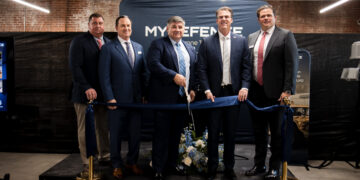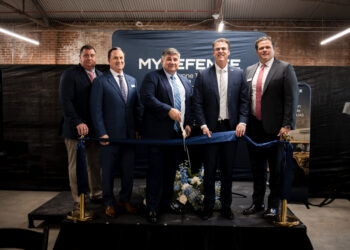OKLAHOMA CITY (OBV) – Oklahoma business leaders say private sector leadership is essential to getting the state’s workforce back on track.
Senate Bill 621, written by Sen. Adam Pugh, R-Edmond, seeks to create the Oklahoma Workforce Commission. The bill succeeded in the Oklahoma Senate and is coming up for vote in the Oklahoma House of Representatives.
The Workforce Commission will be focused on coordinating and developing the state’s workforce, building a workforce plan and using public and private funds to complete its goals.
The commission, as envisioned in the bill, will be composed of nine members, each a representative from Oklahoma’s private business sector. The governor will appoint three members, the House speaker will appoint three members and the Senate pro tem will appoint three members.
“It’s critical that this be run by the private sector so government doesn’t create jobs; the private sector creates jobs,” said Rick Nagel, a managing partner of Acorn Growth Companies, an Oklahoma City-based equity firm focused on aerospace, defense, intelligence and space investments. “So, in order for this to really work and be effective, you’re going to need private sector leaders engaged at the top that will form and be the volunteers on this commission to set the policy. Because no one’s going to be able to describe what’s needed other than the folks that are actually doing the hiring in our State Senate.”
Tim Pehrson, president and CEO of Integris Health, concurred that leading members of the state’s business community should comprise the Workforce Commission.
“The business leaders know the needs of the workforce of the future, and they’re the ones in a perfect position to be able to provide guidance and advice to what the workforce needs are for our community in our state,” Pehrson said. “And then we can have the providers come and actually provide those services based on the needs of the businesses.”
The Oklahoma Workforce Commission was in part inspired by workforce-focused entities in other states, including Utah, Florida, Texas, Alabama and New York. Successful key elements from each state’s model were included in Oklahoma’s workforce management model. Workforce management entities from other states are as follows:
- Utah’s Unified Economic Opportunity Commission (GO Utah) manages economic development strategies both regionally and statewide; coordinates and utilizes federal and state resources and private sector contracts to cultivate economic prosperity; and manages programs and initiatives that support economic workstreams such as corporate recruitment and workforce pathway programs. GO Utah has had positive impacts, with Utah seeing a 19 percent GDP growth rate – the second highest in the U.S. – over the past five years, a 0.8 percent net migration in 2021, which is four times greater than the national average, and achieved WalletHub’s no. 1 state economy ranking for 2021.
- New York’s Jobs CEO Council unites the state’s top employers to launch initiatives to improve workforce development. The council aims to hire 100,000 workers by 2030. Since the Council’s creation, more than 1,500 students have been enrolled in micro-credentialing programs, with 96 percent of those students being people of color. Also, seven companies designed apprentice-based associated degrees with community colleges, resulting in 22 apprenticeships in the program’s first year. Finally, over 760 students participated in professional development and career exploration activities.
- Alabama’s Workforce Development Division and Texas’ Workforce Commission do not have private business leaders in their respective models, but they both manage and coordinate their state’s workforce system.
- Florida’s CareerSource Florida serves as the state’s workforce policy and investment board and is composed of business and government representatives. It works with business and industry partners, educational institutions, and economic and community development agencies to build and maintain a skilled workforce and give residents pathways to good jobs and careers. CareerSource has had numerous successes, including more than 96,000 Floridians gaining employment through CareerSource Network assistance; $2.6 billion in wages for workers assisted by CareerSource; and over 53,000 businesses served through recruiting, hiring and training assistance.
Pugh filed SB 621 in January soon after Gov. Kevin Stitt issued Executive Order 2023-02 to streamline and refocus the state’s workforce management process. The executive order calls for the creation of a Workforce Transformation Task Force. The task force is composed of private sector leaders and public officials tasked with identifying ways funding can be aligned to goals and economic needs, as well as implementing a comprehensive strategy that will change workforce for the better.
The Workforce Commission will direct the state’s workforce development strategy and administer and oversee funding allocated by the legislature for workforce development initiatives. The commission can contract with outside parties to achieve its goals.
“How can we ensure across the entire enterprise of systems and agencies, and individuals and entities that build our workforce, how can we ensure we are creating men and women with the skillsets that they need – whether it be aerospace, engineering, biomanufacturing, agribusiness, healthcare, whatever jobs may exist for my five year old in 2040 that don’t even exist today – and who will be in charge of that?” Pugh said in February. “Senate Bill 621 seeks to provide that answer. And it will work with business leaders in the private sector, with education leaders and with government leaders to ensure that [state government leaders] are not the ones growing the economy, that we’re giving you all the tools you need to grow the economy.”

















